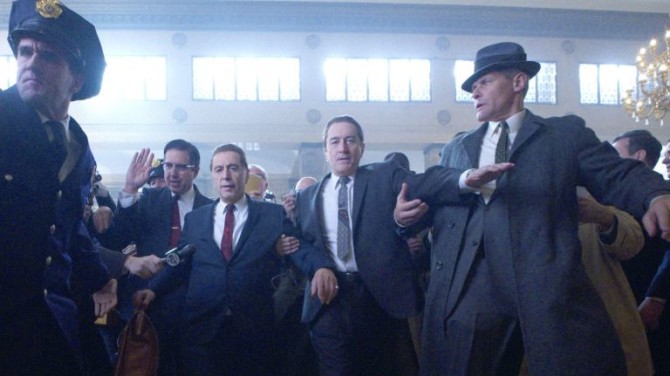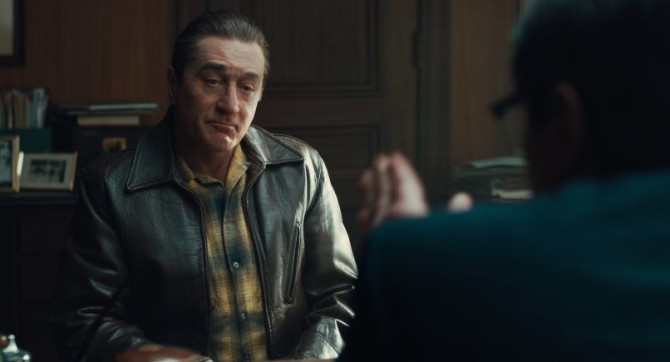Genre: Crime/Period
Premise: An Irish hitman joins the Italian mob, allowing him to meet Jimmy Hoffa, who he develops a deep friendship with.
About: After 10 long years of development, Scorsese’s latest passion project, The Irishman, is here. Unable to get studios interested in a 150 million dollar flick that didn’t have superheroes in it, Scorsese turned to former enemy Netflix to make the film, who was all too happy to bankroll another shot at their current obsession – a Best Picture Oscar. The film’s sky-high budget is due mostly to de-aging its trio of stars, Joe Pesci, Al Pacino, and Robert DeNiro. Here’s my old review of the script.
Writer: Steve Zallian (based on the book by Charles Brandt)
Details: 3 hours and 30 minutes long!
The Irishman is a weird movie.
Its biggest expense – the de-aging of its actors – is so unimpressive as to make you wonder why they went through all the hassle. The idea was strong in theory. Use new technology to turn back the hands of time and give us one more performance from three master actors in their prime.
Except when I think of these actors’ primes, I think ages 30-45. Not 55. Yet that was the age Scorsese covered. While I’m not sure make-up and hair could’ve achieved the same effect, there had to be other options. 80 million bucks seems like an enormous expense for what they delivered. If you’re going to spend that money, we need to be truly transported.
Something tells me that if you would’ve aged these guys to 35 instead of 55, this movie would’ve been a monster hit everyone was talking about. We’d truly feel like we were back in the Pacino and DeNiro hey day. As it stands, the whole thing comes off as a curiosity, an old dog trying new tricks and not executing them well enough to earn a treat.
If the 3 and a half hour running time of The Irishman scared you off, here’s my TLDR. The movie follows a guy named Frank Sheeran, an Irishman who became a hit man for the Italian mob. He took care of people whose interests weren’t aligned with his employers. Sometimes that meant people outside the mob, sometimes it meant people inside.
Big boss Russel Bufalino (Pesci) takes a liking to Frank, and the two work in tandem with Jimmy Hoffa, the teamster leader who has more power than the president of the United States, to rule the roost in the 1960s. But when they get greedy, the government comes after them, and all three end up in prison at one point or another.
When Hoffa gets out, he wants to be reinstated as teamster president. But that ship has sailed. Unable to accept this arrangement, Hoffa keeps pushing and pushing until Bufalino’s had enough and orders Frank to kill him. Frank drives him to an empty house and shoots him in the head. They then burn Hoffa’s body. Frank is conflicted since Hoffa was a friend but this is the life he chose. This is the bed he must lie in.
All of this is told in Scorsese’s trademark MONTAGE-VOICE OVER style, using an older Frank to narrate the events for us. This allows us to speed through years at a time when needed and get full-on bios of the movie’s endless cast of characters.
Something I realized while watching this style is that it’s perfect for big sprawling stories. One of the reasons I always tell you to keep your stories as contained as possible is because contained stories are easier to manage. The more sprawling things get, the harder it is to wrangle it all in in a cohesive manner. Of particular importance is pacing. It’s hard to keep the pace up if you’re randomly jumping forward years at a time. Scorsese’s never-ending voice over montage helps keep these traditionally slow transitions crackling along.
As far as how the script changed since its initial draft 10 years ago, I’d say it both changed a lot and yet not at all. The overall feeling of the movie is EXACTLY the same as that early draft. All of this is exactly how I pictured it would look and feel. But they made some wise choices, like de-emphasizing the plot line where Frank and Hoffa drive to a wedding together. Scorsese seemed to realize, either in the script or in the editing room, that nothing much happened in that storyline, and that the stuff in the past was where it was at.
Another change made was giving a bigger storyline to Frank’s oldest daughter. I’m guessing this choice was made specifically because Scorsese is often critiqued for not providing enough strong female roles in his movies. It was a surprisingly effective plot line, especially the stuff where Bufalino became increasingly upset over the years because Frank’s daughter was the one person on the planet who didn’t like or pretend to like him. Anna Paquin’s nearly dialogue-free performance was one of the most memorable in the film for me.
Conversely, the most disappointing thing about the film were the performances of the big three. They were all nice. But you’re not going into a Pesci, DeNiro, Pacino movie looking for “nice.” You’re looking for great, performances you’re going to remember for the rest of your life. We didn’t get that. One of the most surprising choices was that none of the characters was given a “chews up the scenery” type character to play. Everybody was various levels of reserved. Bufalino was extremely reserved. Frank was fairly reserved. And even the king of overacting, Pacino himself, played Hoffa reserved most of the time.
This robbed the characters of any contrast between one another. If you want great dialogue and great moments, you need contrasting characters. And with everyone so chilled out here, we rarely got that. Some of the better scenes with the three came late when Hoffa began losing his cool. It’s not surprisingly why. The more he lost his cool, the more in contrast he was with Frank.
For that reason, Irishman had to look elsewhere for its good scenes, and my favorite came when Hoffa had to ask rival Tony Pro for his endorsement to get back the top position in the union. The last time we saw these two, Hoffa told Tony he wouldn’t be getting his million dollar pension. Tony then shows up late for the meeting, which pisses Hoffa off, who tells him he wants an apology for showing up late. It only gets worse from there. It was these moments where The Irishman shined brightest – where one person needed something from another and there was all this s#$% in the way that made it difficult. As a writer, tension needs to be one of your best friends. Treat him well and he’ll give you some of your best scenes.
One final beef I had with the script was the lack of a clear narrative for Frank. The title of this movie is “The Irishman” and yet, if you didn’t know that, you wouldn’t have known Frank was Irish. Or that being Irish in this world even mattered. If I remember correctly from the script, Frank’s dream was to become a mob boss. He wanted to get as high up into the mob hierarchy as possible. That goal gave his character purpose and it gave the audience an opportunity to participate.
That’s what a good character goal does – it recruits the audience to root for the hero to achieve what they want. Since we didn’t get any targeted storyline about Frank wanting to be the first Irishman to lead the mob, Frank’s character felt more like an unimportant drifter, a dude who was called upon when an important hit needed to be made. Otherwise, go stand by the wall and shut up. A narrative more focused on him climbing the ranks and getting pushback due to his non-Italian roots would’ve elevated this movie considerably.
And one final problem this movie has that not many people are talking about is there was another movie that came out this year which also faithfully placed us back in the 60s that did everything The Irishman did, just better. That movie, obviously, was Once Upon a Time in Hollywood. Pitt’s and DiCaprio’s performances were so much more fun to watch than these three.
All of this is not to say I didn’t enjoy The Irishman. But to say that the film didn’t meet my expectations would be an understatement. It needed one of these guys – just one of these guys – to give a great performance. And because that didn’t happen, I’d say that this film is best enjoyed as a passive viewing experience while you mess around on your computer for four hours.
[ ] What the hell did I just watch?
[ ] wasn’t for me
[x] worth the stream
[ ] impressive
[ ] genius
What I learned: Look for contrast in the characters who are going to have the most screen time together in your script. If the characters are even a little alike, you’re going to run into a lot of scenes where you’ll find it hard to bring the dialogue alive.



